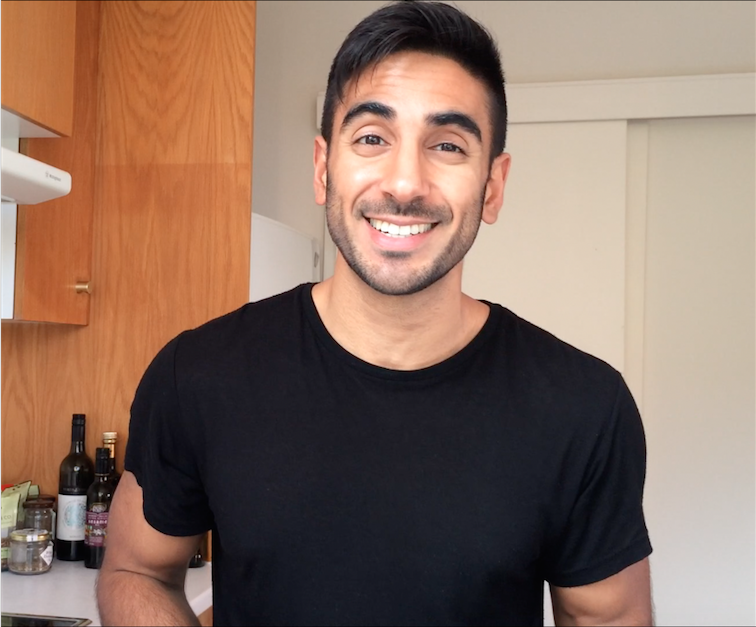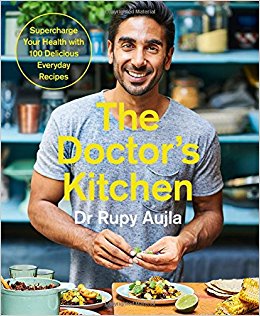
Hi, my name’s Rupy. I’m a medical doctor in the UK, I work in Emergency medicine and General Practice and I believe what you choose to put on your plate is one of the most important health interventions anyone can make. I started The Doctor’s Kitchen to teach people about the beauty of food and the medicinal effects of eating well. I create recipes and talk about the clinical research behind the ingredients I use.
Since starting this project I’ve been inundated with messages from fellow doctors and medical students about the lack of nutrition training in the curriculum. Doctors are simply not equipped with the skillset to have a conversation about diet and many medical schools are yet to wake up for nutrition to be integrated into the standard of teaching.
As a GP and an emergency medicine practitioner, I feel that this training is vital. If we don’t appropriately educate our health professionals on the breadth and utility of other evidence based health interventions, the only option they will have heard of is a pharmaceutical one. We have created a culture where the patient expects a quick fix and the doctor is pressured to offer it in the form of a pill.
This needs to change. It pains me to point out that in the UK we are woefully behind the United States when it comes to schooling new doctors in nutrition. Since 2012, Tulane Medical School in New Orleans have been offering their students an elective in ‘Culinary Medicine’. For each of the modules, students watch an online lecture and read relevant nutrition papers, before attending a hands-on cooking class in their purpose built culinary school. Students are introduced to the kitchen, taught basic knife skills by a chef and introduced to a clinical case study by a doctor that forms the basis of their discussion. After following the recipe instructions and cooking a meal in pairs, the groups of students share a family meal and discuss the ingredients, how they were cooked and the relevance to the clinical case.
It was so popular amongst their medical students and the faculty that these modules are now part of their compulsory medical education. They constantly evaluate their course to make sure it reflects the evidence base and they have over 20 modules looking at nutrition for specific health complaints such as diabetes, congestive heart failure, and mental health.
They even publish papers in a peer-reviewed journals evaluating why this method of teaching in a culinary school learning environment is more effective than didactic lectures. The course is now available for qualified doctors and since 2012 it’s been licensed to almost a quarter of all medical schools in America (which incidentally is more than the number of medical schools in the UK). Tulane are also working on research to demonstrate how effective lifestyle information delivered to patients by doctors on discharge from hospitals can significantly reduce re-admission rates in congestive heart failure and diabetic patients.
This movement needs to happen in the UK. We have a tsunami of chronic disease that will absolutely wipe out NHS resources within a decade unless we start addressing the root cause of ill health. Our lifestyle. The response from medical schools and the NHS is characteristically slow and that’s why I’ve decided to start the ball rolling myself.
Earlier this year I decided to write a cookbook to motivate everybody to look at their plates as positive health interventions, “The Doctor’s Kitchen”. A delicious journey through different cultures and cuisines aligning the science of food in medicine with the culinary arts complemented with 100 recipes. After sealing a deal with Harper Collins, I decided to use a significant proportion of my advance to do something about the state of nutritional education in the UK.
I personally licensed the course content from Tulane medical school and spent a large amount of my time this year updating it for a UK audience working closely with the course director, fellow doctor and former chef, Dr. Tim Harlan from New Orleans. I had it accredited by the Royal College of GPs and started ‘Culinary Medicine UK’ which will work on a non-profit basis to teach health professionals how to cook. Our first course will be in alliance with Westminster Kingsway Culinary school in Feb 2018 and in July we’ll offer an intense 4-week course to medical students at Bristol University.
As health professionals, we have a role in nurturing a culture that recognises the power of our plates and this is how we reverse the tidal wave of lifestyle-related disease in this country. We need to teach doctors how to cook and the value of evidence-based nutrition. We must equip them with the skills to have a lifestyle medicine conversation. And we have to work alongside school initiatives and industry to elevate food as medicine into a mainstream concept in the pursuit of a proactive, healthier population.
You can purchase The Doctor’s Kitchen Cookbook on Amazon today!
For more information on Dr. Lin’s clinical protocol that highlights the steps parents can take to prevent dental problems in their children: Click here.








